University Nursing Assignment: Health Policy and Advocacy Report
VerifiedAdded on 2022/12/15
|7
|1632
|78
Report
AI Summary
This report explores the critical role of health policy and advocacy in nursing, highlighting the significance of master's-level education in preparing nurses to address complex healthcare challenges. The assignment examines the importance of health policy and advocacy, emphasizing the need for nurses to understand healthcare systems, patient needs, and ethical considerations. It delves into the benefits of master's education, including enhanced research abilities, policy-making skills, and the ability to advocate for patients' rights. The report also discusses essential concepts of master's education, such as patient-centered approaches, organizational issues, and culturally responsive care, with a focus on healthcare quality improvement. Additionally, it covers the application of clinical prevention and population health concepts to ensure culturally competent and linguistically appropriate care. The conclusion emphasizes the evolving needs of patients and the importance of continuous learning for nursing professionals to provide effective and quality healthcare.
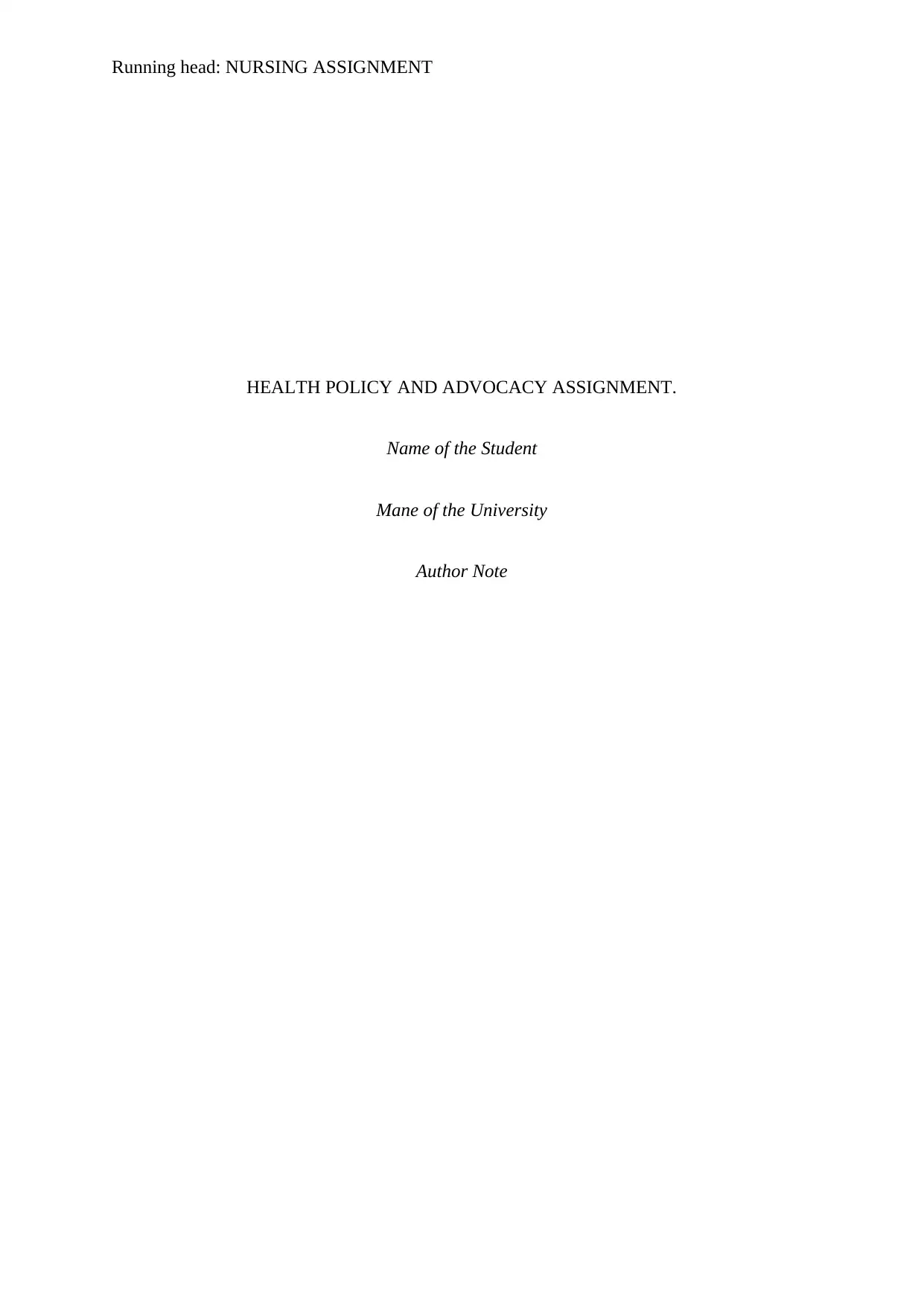
Running head: NURSING ASSIGNMENT
HEALTH POLICY AND ADVOCACY ASSIGNMENT.
Name of the Student
Mane of the University
Author Note
HEALTH POLICY AND ADVOCACY ASSIGNMENT.
Name of the Student
Mane of the University
Author Note
Paraphrase This Document
Need a fresh take? Get an instant paraphrase of this document with our AI Paraphraser
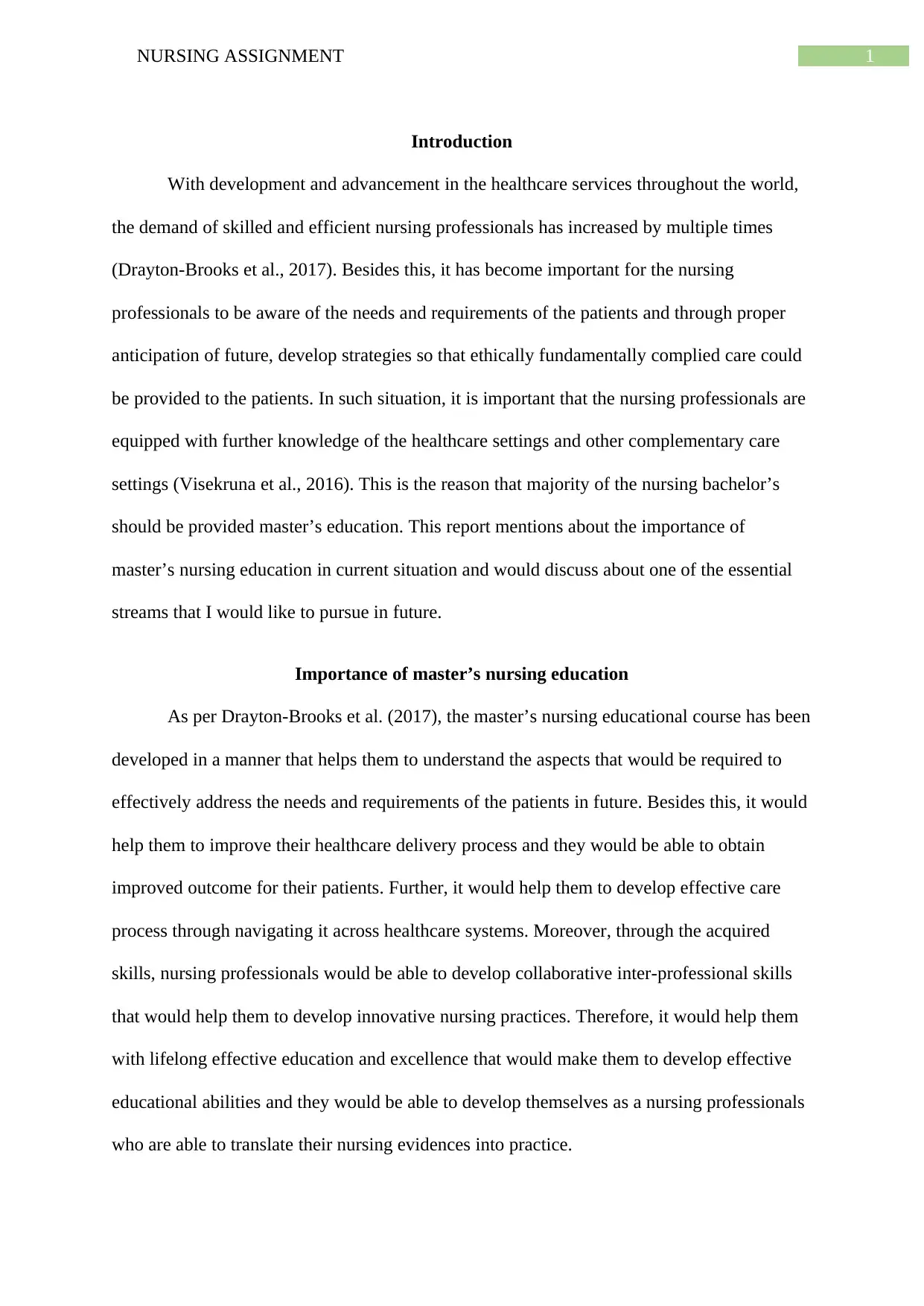
1NURSING ASSIGNMENT
Introduction
With development and advancement in the healthcare services throughout the world,
the demand of skilled and efficient nursing professionals has increased by multiple times
(Drayton-Brooks et al., 2017). Besides this, it has become important for the nursing
professionals to be aware of the needs and requirements of the patients and through proper
anticipation of future, develop strategies so that ethically fundamentally complied care could
be provided to the patients. In such situation, it is important that the nursing professionals are
equipped with further knowledge of the healthcare settings and other complementary care
settings (Visekruna et al., 2016). This is the reason that majority of the nursing bachelor’s
should be provided master’s education. This report mentions about the importance of
master’s nursing education in current situation and would discuss about one of the essential
streams that I would like to pursue in future.
Importance of master’s nursing education
As per Drayton-Brooks et al. (2017), the master’s nursing educational course has been
developed in a manner that helps them to understand the aspects that would be required to
effectively address the needs and requirements of the patients in future. Besides this, it would
help them to improve their healthcare delivery process and they would be able to obtain
improved outcome for their patients. Further, it would help them to develop effective care
process through navigating it across healthcare systems. Moreover, through the acquired
skills, nursing professionals would be able to develop collaborative inter-professional skills
that would help them to develop innovative nursing practices. Therefore, it would help them
with lifelong effective education and excellence that would make them to develop effective
educational abilities and they would be able to develop themselves as a nursing professionals
who are able to translate their nursing evidences into practice.
Introduction
With development and advancement in the healthcare services throughout the world,
the demand of skilled and efficient nursing professionals has increased by multiple times
(Drayton-Brooks et al., 2017). Besides this, it has become important for the nursing
professionals to be aware of the needs and requirements of the patients and through proper
anticipation of future, develop strategies so that ethically fundamentally complied care could
be provided to the patients. In such situation, it is important that the nursing professionals are
equipped with further knowledge of the healthcare settings and other complementary care
settings (Visekruna et al., 2016). This is the reason that majority of the nursing bachelor’s
should be provided master’s education. This report mentions about the importance of
master’s nursing education in current situation and would discuss about one of the essential
streams that I would like to pursue in future.
Importance of master’s nursing education
As per Drayton-Brooks et al. (2017), the master’s nursing educational course has been
developed in a manner that helps them to understand the aspects that would be required to
effectively address the needs and requirements of the patients in future. Besides this, it would
help them to improve their healthcare delivery process and they would be able to obtain
improved outcome for their patients. Further, it would help them to develop effective care
process through navigating it across healthcare systems. Moreover, through the acquired
skills, nursing professionals would be able to develop collaborative inter-professional skills
that would help them to develop innovative nursing practices. Therefore, it would help them
with lifelong effective education and excellence that would make them to develop effective
educational abilities and they would be able to develop themselves as a nursing professionals
who are able to translate their nursing evidences into practice.
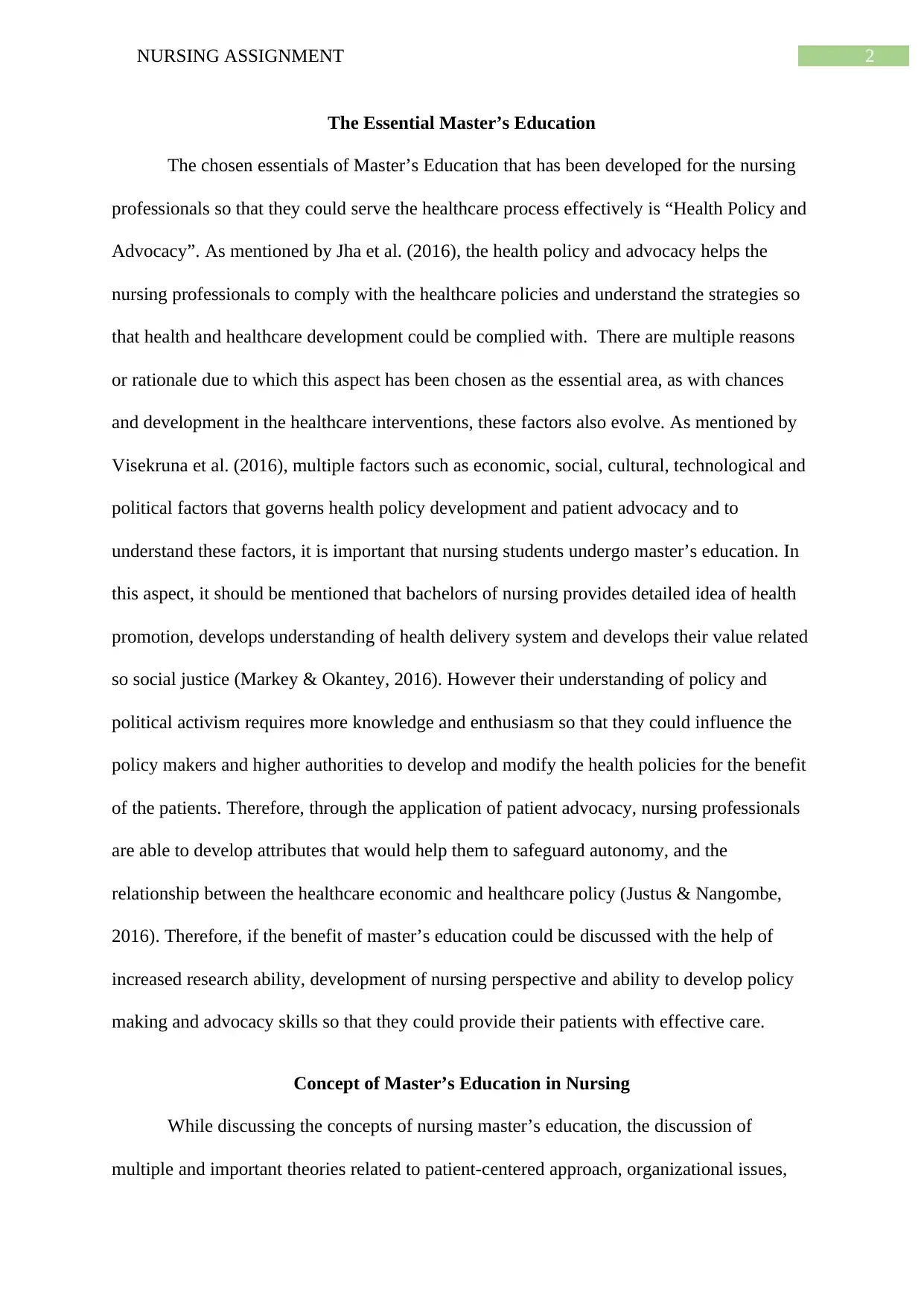
2NURSING ASSIGNMENT
The Essential Master’s Education
The chosen essentials of Master’s Education that has been developed for the nursing
professionals so that they could serve the healthcare process effectively is “Health Policy and
Advocacy”. As mentioned by Jha et al. (2016), the health policy and advocacy helps the
nursing professionals to comply with the healthcare policies and understand the strategies so
that health and healthcare development could be complied with. There are multiple reasons
or rationale due to which this aspect has been chosen as the essential area, as with chances
and development in the healthcare interventions, these factors also evolve. As mentioned by
Visekruna et al. (2016), multiple factors such as economic, social, cultural, technological and
political factors that governs health policy development and patient advocacy and to
understand these factors, it is important that nursing students undergo master’s education. In
this aspect, it should be mentioned that bachelors of nursing provides detailed idea of health
promotion, develops understanding of health delivery system and develops their value related
so social justice (Markey & Okantey, 2016). However their understanding of policy and
political activism requires more knowledge and enthusiasm so that they could influence the
policy makers and higher authorities to develop and modify the health policies for the benefit
of the patients. Therefore, through the application of patient advocacy, nursing professionals
are able to develop attributes that would help them to safeguard autonomy, and the
relationship between the healthcare economic and healthcare policy (Justus & Nangombe,
2016). Therefore, if the benefit of master’s education could be discussed with the help of
increased research ability, development of nursing perspective and ability to develop policy
making and advocacy skills so that they could provide their patients with effective care.
Concept of Master’s Education in Nursing
While discussing the concepts of nursing master’s education, the discussion of
multiple and important theories related to patient-centered approach, organizational issues,
The Essential Master’s Education
The chosen essentials of Master’s Education that has been developed for the nursing
professionals so that they could serve the healthcare process effectively is “Health Policy and
Advocacy”. As mentioned by Jha et al. (2016), the health policy and advocacy helps the
nursing professionals to comply with the healthcare policies and understand the strategies so
that health and healthcare development could be complied with. There are multiple reasons
or rationale due to which this aspect has been chosen as the essential area, as with chances
and development in the healthcare interventions, these factors also evolve. As mentioned by
Visekruna et al. (2016), multiple factors such as economic, social, cultural, technological and
political factors that governs health policy development and patient advocacy and to
understand these factors, it is important that nursing students undergo master’s education. In
this aspect, it should be mentioned that bachelors of nursing provides detailed idea of health
promotion, develops understanding of health delivery system and develops their value related
so social justice (Markey & Okantey, 2016). However their understanding of policy and
political activism requires more knowledge and enthusiasm so that they could influence the
policy makers and higher authorities to develop and modify the health policies for the benefit
of the patients. Therefore, through the application of patient advocacy, nursing professionals
are able to develop attributes that would help them to safeguard autonomy, and the
relationship between the healthcare economic and healthcare policy (Justus & Nangombe,
2016). Therefore, if the benefit of master’s education could be discussed with the help of
increased research ability, development of nursing perspective and ability to develop policy
making and advocacy skills so that they could provide their patients with effective care.
Concept of Master’s Education in Nursing
While discussing the concepts of nursing master’s education, the discussion of
multiple and important theories related to patient-centered approach, organizational issues,
⊘ This is a preview!⊘
Do you want full access?
Subscribe today to unlock all pages.

Trusted by 1+ million students worldwide
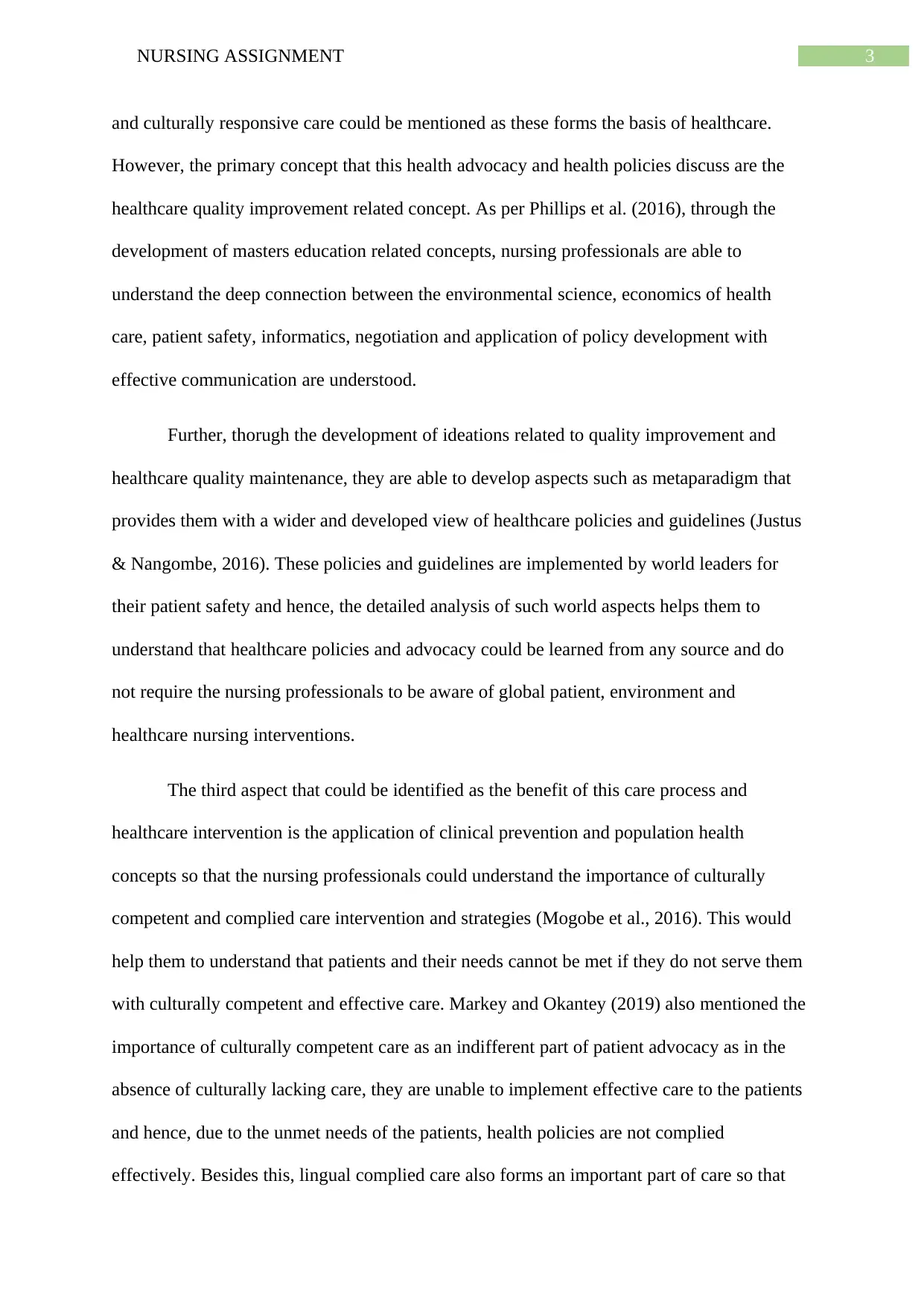
3NURSING ASSIGNMENT
and culturally responsive care could be mentioned as these forms the basis of healthcare.
However, the primary concept that this health advocacy and health policies discuss are the
healthcare quality improvement related concept. As per Phillips et al. (2016), through the
development of masters education related concepts, nursing professionals are able to
understand the deep connection between the environmental science, economics of health
care, patient safety, informatics, negotiation and application of policy development with
effective communication are understood.
Further, thorugh the development of ideations related to quality improvement and
healthcare quality maintenance, they are able to develop aspects such as metaparadigm that
provides them with a wider and developed view of healthcare policies and guidelines (Justus
& Nangombe, 2016). These policies and guidelines are implemented by world leaders for
their patient safety and hence, the detailed analysis of such world aspects helps them to
understand that healthcare policies and advocacy could be learned from any source and do
not require the nursing professionals to be aware of global patient, environment and
healthcare nursing interventions.
The third aspect that could be identified as the benefit of this care process and
healthcare intervention is the application of clinical prevention and population health
concepts so that the nursing professionals could understand the importance of culturally
competent and complied care intervention and strategies (Mogobe et al., 2016). This would
help them to understand that patients and their needs cannot be met if they do not serve them
with culturally competent and effective care. Markey and Okantey (2019) also mentioned the
importance of culturally competent care as an indifferent part of patient advocacy as in the
absence of culturally lacking care, they are unable to implement effective care to the patients
and hence, due to the unmet needs of the patients, health policies are not complied
effectively. Besides this, lingual complied care also forms an important part of care so that
and culturally responsive care could be mentioned as these forms the basis of healthcare.
However, the primary concept that this health advocacy and health policies discuss are the
healthcare quality improvement related concept. As per Phillips et al. (2016), through the
development of masters education related concepts, nursing professionals are able to
understand the deep connection between the environmental science, economics of health
care, patient safety, informatics, negotiation and application of policy development with
effective communication are understood.
Further, thorugh the development of ideations related to quality improvement and
healthcare quality maintenance, they are able to develop aspects such as metaparadigm that
provides them with a wider and developed view of healthcare policies and guidelines (Justus
& Nangombe, 2016). These policies and guidelines are implemented by world leaders for
their patient safety and hence, the detailed analysis of such world aspects helps them to
understand that healthcare policies and advocacy could be learned from any source and do
not require the nursing professionals to be aware of global patient, environment and
healthcare nursing interventions.
The third aspect that could be identified as the benefit of this care process and
healthcare intervention is the application of clinical prevention and population health
concepts so that the nursing professionals could understand the importance of culturally
competent and complied care intervention and strategies (Mogobe et al., 2016). This would
help them to understand that patients and their needs cannot be met if they do not serve them
with culturally competent and effective care. Markey and Okantey (2019) also mentioned the
importance of culturally competent care as an indifferent part of patient advocacy as in the
absence of culturally lacking care, they are unable to implement effective care to the patients
and hence, due to the unmet needs of the patients, health policies are not complied
effectively. Besides this, lingual complied care also forms an important part of care so that
Paraphrase This Document
Need a fresh take? Get an instant paraphrase of this document with our AI Paraphraser
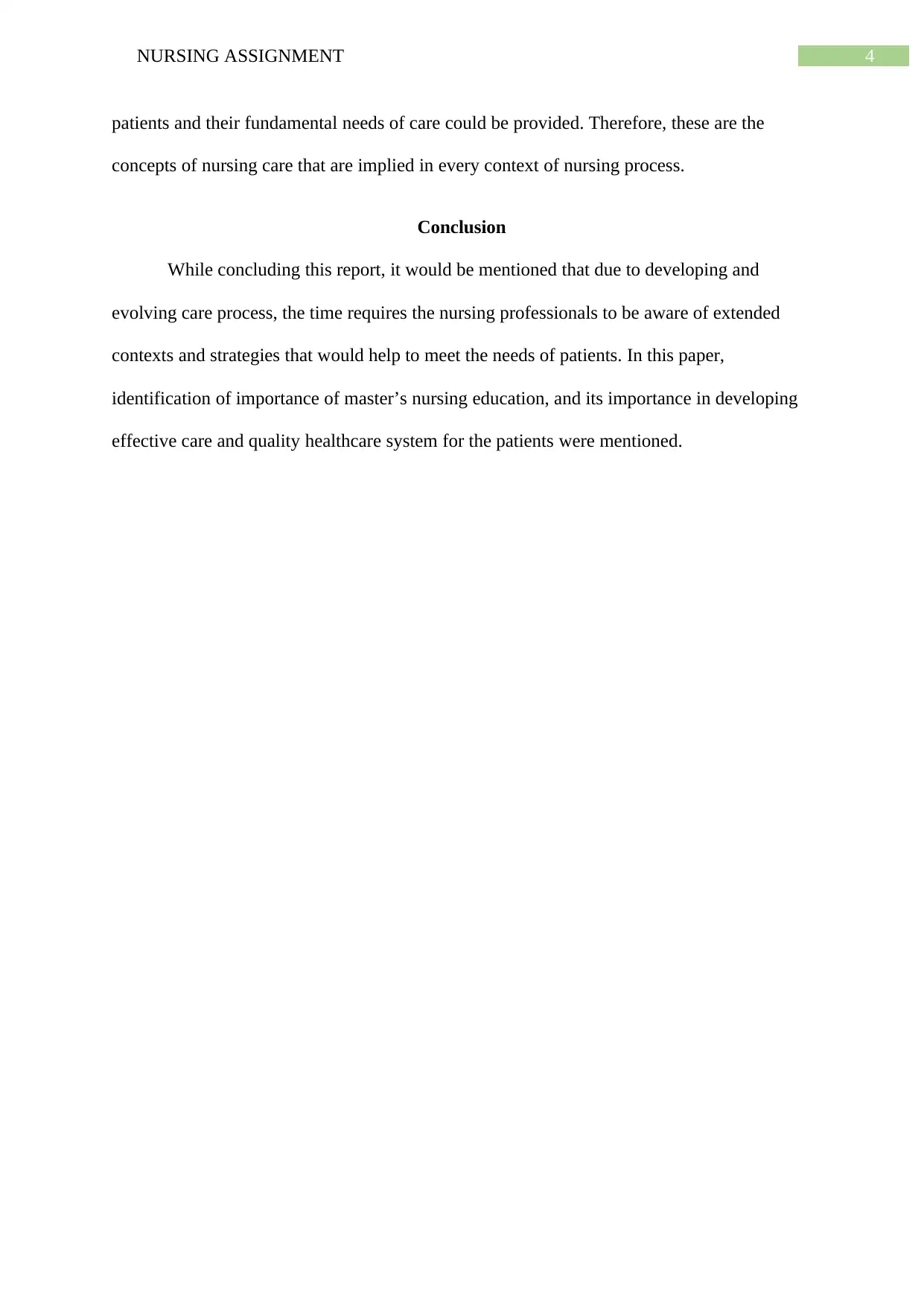
4NURSING ASSIGNMENT
patients and their fundamental needs of care could be provided. Therefore, these are the
concepts of nursing care that are implied in every context of nursing process.
Conclusion
While concluding this report, it would be mentioned that due to developing and
evolving care process, the time requires the nursing professionals to be aware of extended
contexts and strategies that would help to meet the needs of patients. In this paper,
identification of importance of master’s nursing education, and its importance in developing
effective care and quality healthcare system for the patients were mentioned.
patients and their fundamental needs of care could be provided. Therefore, these are the
concepts of nursing care that are implied in every context of nursing process.
Conclusion
While concluding this report, it would be mentioned that due to developing and
evolving care process, the time requires the nursing professionals to be aware of extended
contexts and strategies that would help to meet the needs of patients. In this paper,
identification of importance of master’s nursing education, and its importance in developing
effective care and quality healthcare system for the patients were mentioned.
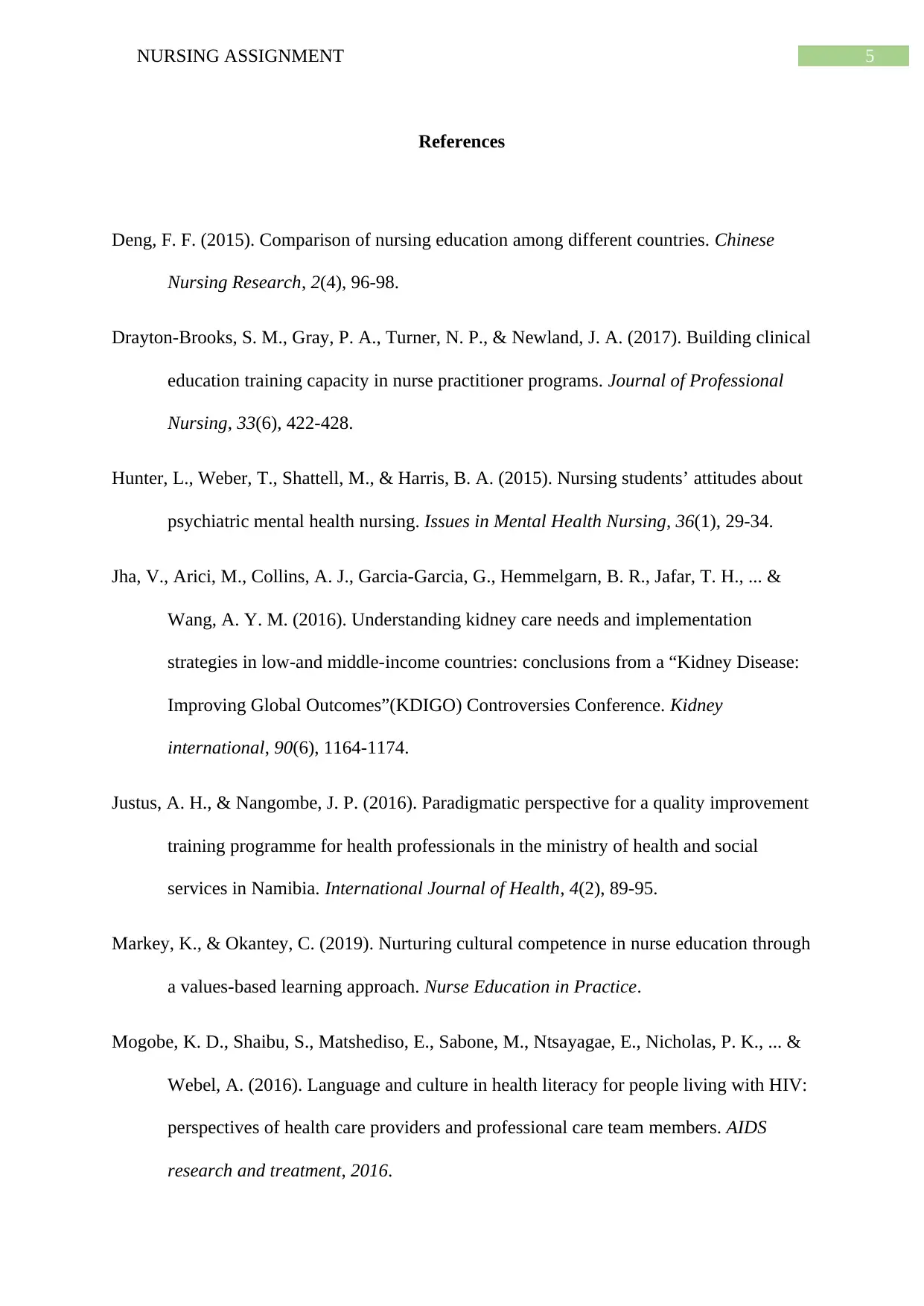
5NURSING ASSIGNMENT
References
Deng, F. F. (2015). Comparison of nursing education among different countries. Chinese
Nursing Research, 2(4), 96-98.
Drayton-Brooks, S. M., Gray, P. A., Turner, N. P., & Newland, J. A. (2017). Building clinical
education training capacity in nurse practitioner programs. Journal of Professional
Nursing, 33(6), 422-428.
Hunter, L., Weber, T., Shattell, M., & Harris, B. A. (2015). Nursing students’ attitudes about
psychiatric mental health nursing. Issues in Mental Health Nursing, 36(1), 29-34.
Jha, V., Arici, M., Collins, A. J., Garcia-Garcia, G., Hemmelgarn, B. R., Jafar, T. H., ... &
Wang, A. Y. M. (2016). Understanding kidney care needs and implementation
strategies in low-and middle-income countries: conclusions from a “Kidney Disease:
Improving Global Outcomes”(KDIGO) Controversies Conference. Kidney
international, 90(6), 1164-1174.
Justus, A. H., & Nangombe, J. P. (2016). Paradigmatic perspective for a quality improvement
training programme for health professionals in the ministry of health and social
services in Namibia. International Journal of Health, 4(2), 89-95.
Markey, K., & Okantey, C. (2019). Nurturing cultural competence in nurse education through
a values-based learning approach. Nurse Education in Practice.
Mogobe, K. D., Shaibu, S., Matshediso, E., Sabone, M., Ntsayagae, E., Nicholas, P. K., ... &
Webel, A. (2016). Language and culture in health literacy for people living with HIV:
perspectives of health care providers and professional care team members. AIDS
research and treatment, 2016.
References
Deng, F. F. (2015). Comparison of nursing education among different countries. Chinese
Nursing Research, 2(4), 96-98.
Drayton-Brooks, S. M., Gray, P. A., Turner, N. P., & Newland, J. A. (2017). Building clinical
education training capacity in nurse practitioner programs. Journal of Professional
Nursing, 33(6), 422-428.
Hunter, L., Weber, T., Shattell, M., & Harris, B. A. (2015). Nursing students’ attitudes about
psychiatric mental health nursing. Issues in Mental Health Nursing, 36(1), 29-34.
Jha, V., Arici, M., Collins, A. J., Garcia-Garcia, G., Hemmelgarn, B. R., Jafar, T. H., ... &
Wang, A. Y. M. (2016). Understanding kidney care needs and implementation
strategies in low-and middle-income countries: conclusions from a “Kidney Disease:
Improving Global Outcomes”(KDIGO) Controversies Conference. Kidney
international, 90(6), 1164-1174.
Justus, A. H., & Nangombe, J. P. (2016). Paradigmatic perspective for a quality improvement
training programme for health professionals in the ministry of health and social
services in Namibia. International Journal of Health, 4(2), 89-95.
Markey, K., & Okantey, C. (2019). Nurturing cultural competence in nurse education through
a values-based learning approach. Nurse Education in Practice.
Mogobe, K. D., Shaibu, S., Matshediso, E., Sabone, M., Ntsayagae, E., Nicholas, P. K., ... &
Webel, A. (2016). Language and culture in health literacy for people living with HIV:
perspectives of health care providers and professional care team members. AIDS
research and treatment, 2016.
⊘ This is a preview!⊘
Do you want full access?
Subscribe today to unlock all pages.

Trusted by 1+ million students worldwide
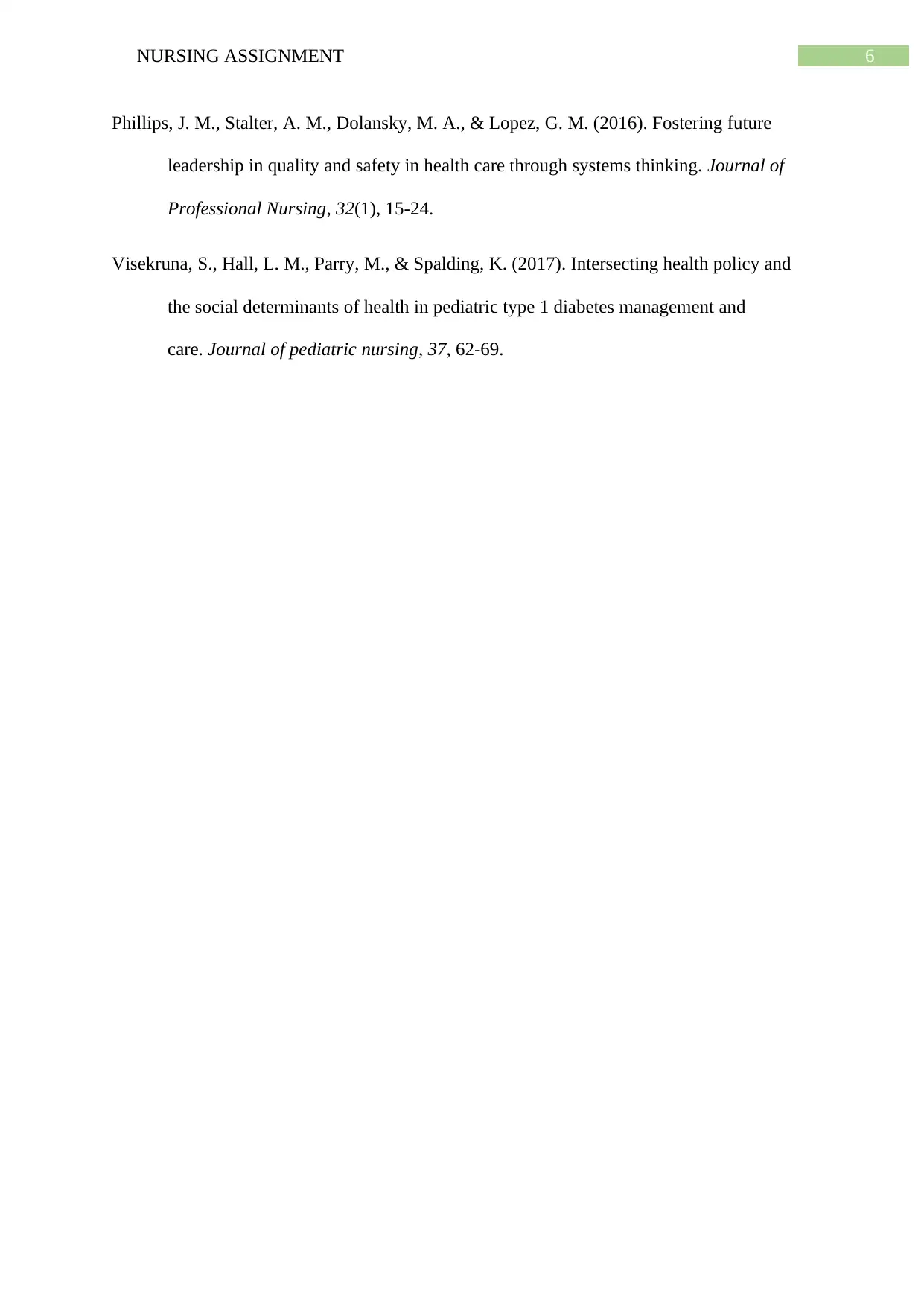
6NURSING ASSIGNMENT
Phillips, J. M., Stalter, A. M., Dolansky, M. A., & Lopez, G. M. (2016). Fostering future
leadership in quality and safety in health care through systems thinking. Journal of
Professional Nursing, 32(1), 15-24.
Visekruna, S., Hall, L. M., Parry, M., & Spalding, K. (2017). Intersecting health policy and
the social determinants of health in pediatric type 1 diabetes management and
care. Journal of pediatric nursing, 37, 62-69.
Phillips, J. M., Stalter, A. M., Dolansky, M. A., & Lopez, G. M. (2016). Fostering future
leadership in quality and safety in health care through systems thinking. Journal of
Professional Nursing, 32(1), 15-24.
Visekruna, S., Hall, L. M., Parry, M., & Spalding, K. (2017). Intersecting health policy and
the social determinants of health in pediatric type 1 diabetes management and
care. Journal of pediatric nursing, 37, 62-69.
1 out of 7
Related Documents
Your All-in-One AI-Powered Toolkit for Academic Success.
+13062052269
info@desklib.com
Available 24*7 on WhatsApp / Email
![[object Object]](/_next/static/media/star-bottom.7253800d.svg)
Unlock your academic potential
Copyright © 2020–2025 A2Z Services. All Rights Reserved. Developed and managed by ZUCOL.




